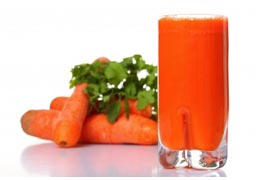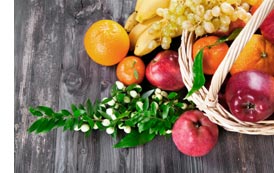Squeezing the Truth Out of Juice Cleanses
- By Charlene Oldham
- Reading Time: 6 mins.
When Wendie Schneider wrote a blog post about her plan to try an all-juice cleanse, some of her fellow dietitians who read it feared she’d seen one too many celebrity endorsements or perhaps planned to market her own cold-pressed concoction to her clients.
“They were all up in arms that I was going to write about it because, from a dietitian’s standpoint, juice should only be used to supplement real fruits and veggies in a healthy meal plan,” Schneider, the dietitian behind the Pantry Doctor website, blog, and lifestyle and nutrition coaching business, told The FruitGuys Magazine.
But juice fasting’s dubious healthfulness hasn’t stopped people from flocking to the trend. Juice cleanses are believed to clean the body of toxins and help with weight loss. Juicing has been endorsed by everyone from Dr. Oz to Kim Kardashian, leading to soaring sales for many expensive juice products and cleanse subscriptions. Depending on how home juicing, storefront sales, and bottled beverage sales are counted, the value of the super-premium juice market could be anywhere from $1.6 billion to $3.4 billion, according to BevNet Magazine. And while not everyone who juices at home or purchases cold-pressed packaged brands like Suja and BluePrint uses them for cleanses, a growing number of people had been asking the licensed dietician about liquid-only programs. Some clients liked the idea of losing a few pounds or ridding their systems of toxins, so Schneider thought she should at least try a juice fast to see how it felt.
Schneider admits she cheated by eating a few healthy vegan meals during the three-day cleanse, which had her at times feeling hungry, sleepy, or headachy. She said the cleanse left her little energy to exercise and even made it challenging to get out of bed. (Suja’s company website also states it’s “completely normal” for some people to “experience headaches, dizziness, fatigue and moodiness” during a juice cleanse.) At other points, she felt overly full and bloated and briefly put on five pounds.
Schneider’s own experience leads her to believe juice cleanses aren’t an effective way to lose weight long term or rid your system of toxins that may be in processed products or other foods we eat and drink every day.
“A lot of my clients might bring this up as a quick fix or detox and I hate that word because the only way you’re going to detox your body is to quit putting junk into it,” she said.
Get tips for your office
Be an office hero!The Self-Cleaning Body
Katherine Zeratsky, a dietician with the Mayo Clinic explains the human body has evolved over time to effectively eliminate most of the toxins humans ingest.
 “Your body can do all the cleansing you need. The liver and kidneys are pretty spectacular organs.”
“Your body can do all the cleansing you need. The liver and kidneys are pretty spectacular organs.”
Even the lungs and intestines play a role in ridding your body of toxins, so many of the perceived detoxification benefits some people report experiencing during a juice-only cleanse might come from cutting out processed foods that are high in fat, salt, and sugar. And considering the average American gets nowhere near the recommended five to 13 servings of fruits and vegetables each day, consuming nearly any form of fruit or vegetable marks progress.
“Getting more fruits and vegetables into your diet—that’s where they are on to something,” Zeratsky told the Almanac. “But they are one part of a healthy diet. They are not the only part of a healthy diet.”
However, some juicing proponents have taken a cue from Joe Cross, an Australian businessman and maker of the documentary Fat, Sick & Nearly Dead, who tipped the scale at more than 300 pounds. In the film, Cross committed to a 60-day juice fast and lost nearly 100 pounds under the supervision of his doctor. Today, the Internet abounds with websites and blogs by people who’ve tried similar plans, but an extended fast can be very dangerous to those with conditions such as diabetes. Juice-only diets also typically lack amino acids, fiber, and healthy fats.
“I wouldn’t want anyone to go too long without those or other essential nutrients,” Zeratsky said of extreme juice-only diets. “And you don’t necessarily want to be using your own muscles as protein sources. The calories from the juice would keep you alive, but you wouldn’t necessarily be in optimal health.”
Want fruit for your office?
Get your office a free sample TODAY!Stressed? Don’t Cleanse
And even fans of cleanses caution against undertaking lengthy programs without close professional supervision. Ann Louise Gittleman, a certified clinical nutritionist and author of The Fast Track Detox Diet says short-term cleanses can help people reassess their relationship with food, among other things, but she wouldn’t typically recommend going more than three or four days on an all-liquid diet. Longer cleanses can lower your metabolic rate and place the body into a prolonged starvation mode without key macronutrients such as protein and fat, she says. And all-juice cleanses aren’t ideal for those who are under serious mental or physical stress. For example, no one training to run a marathon or transitioning to a new career should be on such a restrictive program.
“Others who should not fast include those suffering from anxiety or depression, women who are pregnant or nursing, those recovering from an illness or injury, and individuals who are anemic or prone to eating disorders,” she told the Almanac. “Don’t get me wrong. I’m one of the all-time original juicing fans. But I don’t think that everybody needs to go full steam ahead with a stringent all-juice cleanse for extended periods of time.”
Instead, she and other nutrition experts advocate adding more whole fruits and vegetables to an everyday balanced diet. Using low-sugar vegetable and fruit juices as a snack or drinking smoothies with healthy added protein sources can also be a sustainable way to incorporate the juicing trend into an eating plan.
The Price of Cleansing
After three days on a juice cleanse, broken up by a few healthy vegan “cheat” meals, Schneider felt bloated and overly full, contradicting some people’s testimonies of feeling clean, and even airy, after an all-liquid cleanse. For Schneider, there was one thing that felt lighter after her cleanse: her pocketbook.
While some people cut the costs of an all-juice cleanse by buying a juicer and their own organic fruits and vegetables, commercial cold-pressed juices can range from around $6.99 to $12.99 a bottle at national health food market chains, and all-juice cleanses typically consist of six servings a day. (Schneider relied on local juice shops to supply herself.) “So we’re talking sometimes up to $60 or $70 a day,” said Schneider.
On its website, the cold-pressed juice company Suja offers its one-day Fresh Start program for $55, with a three-day supply going for $162 and five days for $270. According to its website, BluePrint Cleanse products typically average around $65 a day.
Most companies also offer corporate or group discounts. And, while support groups are effective encouragement when it comes to lifestyle changes, Schneider wouldn’t recommend juice cleanses as a team-building experience in most offices unless morning meetings start slow and whole-group afternoon naps are part of the plan.
Schneider says she is glad she tried an all-juice cleanse, even though she succumbed to the siren song of solid food a few times and was plagued by fantasies of chili dogs and Little Debbie snack cakes—foods that never cross her mind under normal circumstances. “Now when people ask about it, I can tell them I had that experience; I can tell them about it before making recommendations and give first-hand advice,” she said. “The best way I can say it is, the only way to truly ‘detox’ your body is to quit putting bad stuff in [it]. ”
Want farm-fresh fruit?
We've got you covered.
Charlene Oldham is a St. Louis, MO-based journalist.


